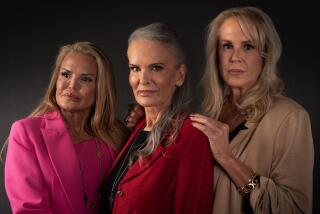The Only Thing Predictable Is That Women Will Lead
- Share via
A lot of white people say O.J. Simpson is assured of acquittal or, at the least, a hung jury because his jury is predominantly black.
That view assumes that blacks will automatically support a brother, that African Americans share the same opinions, as if they were connected by a black Internet that sends out instructions on how to think about the issues of the day.
It’s a simplistic view that ignores the complexity and diversity of the black community, where age, income, education, religious beliefs and gender--as well as race--shape African American opinions.
Gender is an especially important consideration with the Simpson jury: six of the eight black jurors are women.
*
Anyone who has observed community life in black neighborhoods of Los Angeles is aware of the influence of African American women.
Four of South-Central Los Angeles’ most influential black politicians are women--Rep. Maxine Waters, state Sen. Diane Watson, Supervisor Yvonne Brathwaite Burke and City Councilwoman Rita Walters.
Throughout the Los Angeles area, block clubs that are largely run by women organize neighborhood watches and work with the Police Department on crime-fighting programs, pushing the cops hard when the LAPD is slow to respond or is hostile to residents. Women are also powerful forces in South-Central’s many churches, and head several nonprofit organizations that build housing for those with low incomes.
The block clubs, the nonprofits and the churches form a strong community infrastructure, and every political candidate trying to tap into it knows the important role of women in keeping it together.
I discussed this Friday with Karen Bass, an African American woman who is executive director of the Community Coalition Against Substance Abuse, which led the successful fight to drastically reduce the number of liquor stores in South-Central.
“One of the things that is unique about our community is that African American women have never had the luxury of not being in the forefront,” she said. “African American women have always been out in the work force. Those kind of gender issues that might be typical in the white community are not typical in the African American community. Being at home and being a full-time mother is luxury. As an African American woman who has been in a leadership position all my life, it is easier to be accepted in that position because it is more common in our community.
“This is not to the exclusion of African American men,” she said. “We have always been side by side. That goes back to slavery, and that notion has persisted through time. I think one of the things that has been bad has been the whole denigration of the African American male, where people say we (women) are in leadership positions because men have been irresponsible. What is ignored is that we have always been in leadership positions.”
*
How will this history and personal experience impact the jury deliberations?
Melanie Lomax, former president of the Los Angeles Police Commission, speculates that in some respects, the presence of black women on the jury might be a plus for Simpson.
“One thing that tends to be true about black women is that they tend to personalize and internalize the struggle of black men in the world,” said Lomax, who is an attorney. “They are taught from birth--I know I was--to be protective of black men because they have historically gotten the brunt of brutality, of racism.”
This, she said, provides a real opening for co-defense counsel Johnnie L. Cochran Jr., an African American who is highly respected in the community.
But there are factors, she said, that counter this feeling.
One is the fact that Simpson “has not been a visible committed member of the black community. . . . He has gotten away from his roots and has done all he can do to distance himself from the black community and his project origins, and I don’t think this plays well.”
Another is the issue of spousal abuse and Simpson’s history of violent conduct toward his then- wife, Nicole. “The black women on the jury are on common ground with all women, and they will lock into the plight of Nicole Simpson and they are very unlikely to be seduced by the idea that Nicole was taunting or provoking or engaging in provocative behavior that gave him license.”
There’s a final point to which Lomax didn’t give much credence, but to which other African American women subscribe--Simpson’s divorce of his wife, who is black, and marrying the white Nicole.
*
A Times Poll in September found that just 12% of African American women thought Simpson was guilty, 35% said he was innocent, and 53% did not know. Interestingly, 60% of the women said it would be easy for them to suspend preconceived notions if they were on the jury.
That last finding is important. For as the African American women listen to testimony, their notions may be changed, as will those of their colleagues. But they won’t forget their life experiences, and these will be part of the mix they bring to the deliberations.
“I don’t expect the black women to vote as a group,” attorney Lomax said. “I don’t expect them to see the case all the same way. It depends on their own value structure and sense of morality.”
This makes the outcome unpredictable. All that is certain, she and the other women I interviewed said, is that the African American women will be a strong influence on the jury. And for them, it won’t be a simple matter of voting for a brother.
More to Read
Sign up for Essential California
The most important California stories and recommendations in your inbox every morning.
You may occasionally receive promotional content from the Los Angeles Times.













